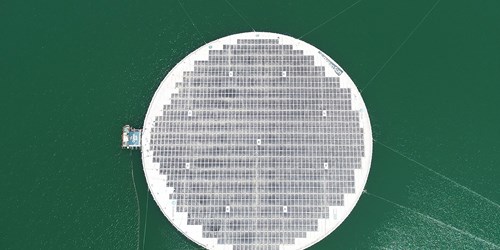
Albania’s first floating solar power plant has commenced operations this week.
Two companies, Statkraft, and Ocean Sun collaborated on the project which is located at the Banja reservoir. There is also a 72-megawatt hydropower plant at the site which is operated by Statkraft. The solar plant is now completed, connected to the grid, and generates renewable energy for use in Albania.
The structure consists of a large, floating ring and a thin membrane. The coolness of the water underneath reduces the temperature of the panels which are in direct sunlight. The technology is unique and while the membrane is only a couple of millimeters thick, it supports the weight of the panels on top.
There are some 1536 individual solar panels on this plant with a capacity of 0.5 MWP and covering a surface of some 4,000 square meters. A further 160 panels have been placed on land nearby.
During the second half of the year, an additional three floating units will be constructed and connected. Combined, they are expected to generate 1.5 MWP.
CEO of Statkraft, Christan Rynning-Tonnesen said: “This is a great milestone in an innovative floating solar project, and it is exciting to see the plant come alive and provide additional renewable energy production in Albania. We are looking forward to the concrete results of this demonstration project to assess the potential for further expansion of this exciting technology.”
“We are very pleased to start commercial operations of the new Ocean Sun flagship floater at Statkraft’s Banja reservoir. This demonstrates the safe, simple, and fast construction methodology. We were able to install the solar panels at record-breaking speed. I wish to thank the proficient teams at Statkraft and the local contractor Doko. The collaboration has been excellent, and their competence and knowledge made the installation a pleasure from start to finish. We look forward to the second stage of the project and to demonstrate the high performance of our solution,” says the CEO of Ocean Sun, Børge Bjørneklett.
Albania generates much of its power from hydropower. But as the HPPs only generate power for some months of the year and the power isn’t stored, Albania sells much of it. Then during the winter months, it’s forced to import power at a premium price, meaning consumers pay more. Furthermore, hydropower is no longer considered a green option due to the damage it causes to rivers, ecosystems, flora, fauna, and communities near them.
With Albania experiencing more than 300 days of sunshine a year, many experts prefer solar power and wind power to hydropower and fossil fuels.

